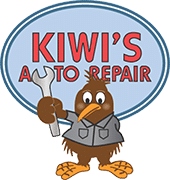Your car has numerous electrical components, ranging from the windows to the throttle. Any electrical or electronic component failure can leave you stranded. So, how do you know if you have electrical issues in car?
It’s easy to misdiagnose problems with your vehicle’s electrical system. Sometimes it is the loose battery cables that cause the problem. At times, the alternator or other components may need to be replaced. Only an ASE-certified repair shop, such as Kiwi’s Auto Repair, can provide a definitive diagnosis.
Here are tell-tale signs that your vehicle’s electrical system is about to fail.
1. The Engine Won’t Turn On
Your car requires electrical power to run its engine. The battery powers your starter motor, which turns the engine and ignites fuel via spark plugs or glow plugs. If your engine fails to start, it could be due to a faulty alternator, battery, starter motor, or other ignition components.
To start your engine and charge the vehicle’s electrical system, your alternator, battery, and spark plug must all work together.
When you turn the key and hear a clicking or grinding noise, you know your car has a problem. A flat battery produces a clicking sound, while a faulty alternator produces a grinding sound. Contact a local mechanic to replace a faulty spark plug, alternator, or starter motor, especially if your vehicle is older.
2. Car battery problems
Do you have battery issues? It could be that your battery is dying or something else. Car batteries have a lifespan of up to 5 years. Perform a battery test to ensure that everything is in working order.
Sometimes, a bad alternator could be the problem. The alternator is responsible for charging the battery and can cause severe electrical problems. Only a certified auto electrical repair person should test your alternator.
If you frequently require a jump start, check to see if your battery cables have worn out. Otherwise, your battery is dead. To keep everything running smoothly, try replacing the battery at a local auto electric repair shop.
3. Bad headlights, dashboard lights, and other lights
Have you ever tried driving at night or in the snow with your headlights turned off? Car headlights improve visibility at night and in inclement weather. Electrical issues can cause your headlights to malfunction. When driving, other lights such as brake lights, turn signals, and interior lights are also important.
A low-charge battery, loose cables, a bad alternator belt, or poor electrical grounding are the most common causes of dim lights.
Do you have a check engine light? Your vehicle could be experiencing serious motor or electrical issues. Look in your owner’s manual for the cause of the check engine light on your specific model.
Corrosion of electric cables or terminals can sometimes result in costly repairs. Check the voltage of the various components with a multimeter. A vehicle’s electrical problems are not always simple to resolve; you may require professional diagnosis and car electrical repair.

4. Regularly blown fuse
Every car has a fuse box that contains fuses that prevent short-circuiting and overvoltage. A fuse interrupts the circuit and protects the car’s electronics.
It is not unusual for the fuse to blow. Fortunately, changing the fuse and getting your car back on the road is simple. If you notice several blown fuses, you may have serious electrical problems. It could be an indication of a problem with your batteries or alternator.
If one or more fuses blow again, we recommend that you have your electrical system professionally diagnosed and repaired. Contact Kiwi’s Auto Repair before overvoltage destroys critical components.
5. Burning Smell
A burning odor coming from a car’s engine is a cause for concern. It could be anything from a burning car to a simple electrical malfunction. In any case, if you smell something burning, pull over immediately and investigate.
You might notice a burning smell if you experience any of the electrical problems listed above, like dim lights, alternator or battery problems, or blown fuses. Get your car towed to an auto shop to prevent further car electrical damage.
Below are some common burning smells:
Burning Plastic
An electric short circuit is a major cause of plastic odor. Overheating can cause the plastic coating on wires, fuses, or other connections to melt. Have your heater serviced and have a technician inspect your electricals.
Burning Rubber
One of the most common burning rubber smells has to be burning rubber. The odor could be caused by a faulty clutch, drive belt, leaking oil, or leaking coolant. If you leave your car running for an extended period of time, you will notice the smell.
Burning carpet
Do you have a burning carpet odor in your car? This burning odor is commonly associated with worn brakes. Get a new set of brake pads to clear any warning lights on the dashboard.
Burning Oil
A burning oil odor can indicate a number of issues. If you are past due on your vehicle’s service, you will most likely notice a burning oil odor. In most cases, old oil and filters leak oil into the combustion chamber. Blown gaskets and oil plug damage are two other causes of rough idling.
Regular maintenance will keep your engine healthy and ensure that warning lights become obsolete.
Visit Kiwi’s Auto Repair for all Automotive and Electrical Repairs
Kiwi’s Auto Repair is an ASE-certified auto repair and maintenance garage with years of experience and expertise. We deal with all electrical issues in car electrical systems. We replace your dead battery, blown-up fuse, spark plugs, oil change, and starter motor to ensure your vehicle runs smoothly.
Our satisfaction guarantee ensures that you do not receive an incorrect diagnosis for our services. Contact us today for a quick turnaround on any job we take on. Our clients are extremely satisfied with our services.
Give us a call at (805) 963-3444 to have your vehicle repaired by a licensed and insured family-owned business at the Santa Barbara location since 1999!
